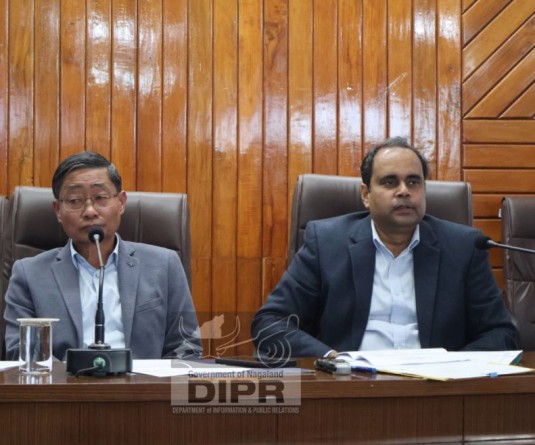
- CAG report says “possibility of pilferage of the food grains cannot be ruled out”
- School education dept in their response claim “poor maintenance of records & lack of training”
- CAG recommends conduct of “independent investigation and take administrative actions against officials found guilty”
Morung Express News
Dimapur | March 26
The quality and health of primary school education as envisaged by the Mid Day Meal Scheme, a centrally sponsored programme covered by the National Food Security Act, 2013 is being sacrificed under the altar of middlemen’s greed. In a disconcerting revelation, hoarding of cooking utensils, short receipt of food grains by schools indicating possible pilferage, deducted honorariums for cook-cum-helpers have been detected in the Mid Day Meal (MDM) Scheme under the School Education Department, Nagaland by the Comptroller and Auditor General of India (CAG) as mentioned in its report on the social, economic, revenue and general sectors of Nagaland State.
The damning report highlighted that the department procured (January and November 2013) kitchen utensils valued at Rs 50 lakh for distribution among schools covered under the MDM from two firms. However, the same was not disbursed and the utensils were stored in two official go-downs of the Directorate of School Education (DSE), Kohima.
As per the position of stock and value as on the date of verification (August 2015), the two go-downs had 1000 big sized aluminum cooking pots at a bill value of Rs 20.40 lakh, around 25,000 steel plates of standard size at a bill value of Rs 13.25 lakh and 25,000 steel cups of standard size at a bill value of Rs 8.50 lakh.
The sum total of the bill which amounts to Rs 44, 15,000 when added with 13.25% Value Added Tax (VAT) of Rs 5, 84,988 come to a grand total of Rs 49, 99,988.
In a critical remark, the CAG report said non distribution of MDM cooking utensils not only blocked central assistance funds but had “adverse effect on implementation of the scheme as 72 schools reported insufficient cooking pots/plates during physical verification.”
On this, the department contended that the delay in distribution of the materials was due to non-receipt of replacement list. However, the CAG report pointed out that the materials were procured without assessing the field requirements.
It should be mentioned that the MDM scheme envisages assistance for provision and replacement of kitchen devices in a phased manner, at an average cost of Rs 5000 per school. Financial Rules provide that purchase of stores shall be made in accordance with definite requirements and care shall be taken not to purchase stores much in advance of actual requirement.
83 schools received only 463.56 MT food grains against 1248.31 MT
The CAG report has also revealed short-receipt of food grains by selected schools. The scheme guidelines envisage that food grains as per norm should be released to the schools expeditiously for smooth implementation of the scheme so as to enable serving of good quality of cooked meal to the eligible children on all school working days.
Examination of records of 120 schools under eight selected Sub-Divisional Education Officer (SDEOs) revealed that 83 schools, during 2010-2015, received 463.56 Metric Tonnes (MT) of food grains against recorded disbursement of 1248.31 MT as per records of the SDEOs concerned, the report stated.
This means, 784.75 MT of food grains valued at Rs 44.34 lakh was short received by the selected 83 schools which adversely impacted in providing mid-day meal to the eligible school children, the CAG report noted.
The report said 15 schools under SDEO Kohima, 7 under Chiephobozou, 21 under Dimapur, 6 under Niuland, 20 under Mon, 8 under Aboi and 6 under Shamator were short-receipt of food grains.
The shortfall in estimated coverage of MDM on account of non-disbursement of food grains for eligible school children work out to 63%, the report calculated. Also pointing out that the “possibility of pilferage of the food grains cannot be ruled out,” the report stated that the “matter requires further investigation.”
The department claimed that the “short receipt was due to poor maintenance of records by the school teachers who were not properly trained and frequent changes of MDM teacher-in-charge.” The CAG in apparent disbelief of the response pointed out that - “yet again an attempt to cover up the lapse of maintenance of records does not require any extraordinary skill and training.”
Rs 24.87 lakh honorarium for cook-cum-helpers deducted from 73 schools
Even the honorariums meant for cook-cum-helpers of Rs 1000 per month have not been spared. The CAG revealed that 73 schools in six SDEOs (out of 8 selected) received “less” cook-cum-helpers honorarium than shown as disbursed by the SDEOs. The honorarium was disbursed in cash by the SDEOs to the schools in contravention to the provisions in the guidelines which envisages e-transfer of fund.
The short-receipt amount of Rs 24.87 lakh by the selected schools, which is 75.56% of the total honorarium, had “adversely affected in implementation of the scheme as the cooks did not perform their duties on all school working days due to non/less receipt of honorarium, as reported by the schools authorities during joint physical verification,” the CAG reported.
Again, the department, in the report, blamed the short receipt of the honorarium as “due to poor maintenance of records by the school teachers who were not properly trained and frequent changes of MDM teacher-in-charge.”
Recommendations
CAG has recommended that an independent investigation be conducted to find out the reasons for short receipt/discrepancies in receipt of cooking cost, transportation cost, food grains and honorariums for cook-cum-helpers across the State and take administrative actions against those officials found guilty.






